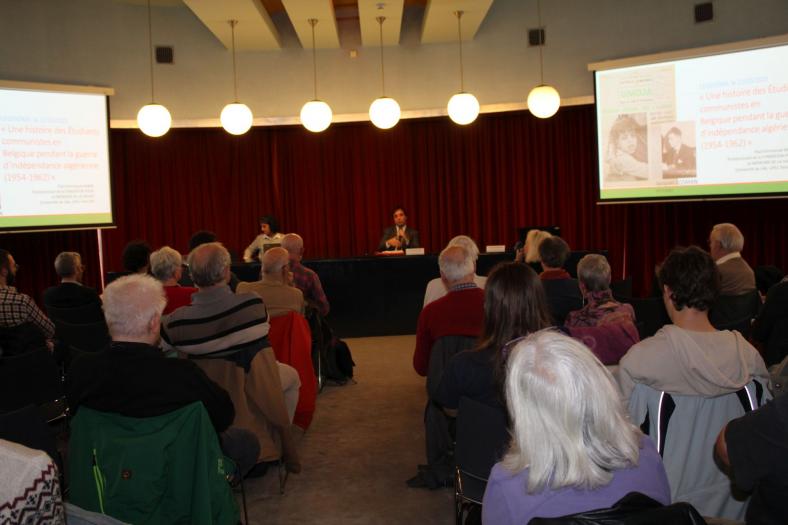Workshop report: New Critical Perspectives on Communists and Communism in Belgium.

On Wednesday, 22 October, an international workshop was held at CegeSoma entitled New Critical Perspectives on Communists and Communism in Belgium. In their introduction, Chantal Kesteloot and Widukind De Ridder, explained how more than a year after the passing of José Gotovitch it was time for junior and senior scholars to reflect on new avenues of research, innovative methodologies, and recently accessible sources.
The first session explored the intricate relationship between communism and several transnational solidarity movements — for instance, with Algeria between 1954 and 1962, and with the anti-apartheid movement from the 1960s to the 1980s. Paul-Emmanuel Babin examined how the communist youth and student movement at the Université Libre de Bruxelles came into conflict with the party hierarchy over its denunciation of the “genocide” that France was committing against the Algerian people.
Aline Martello seamlessly linked the anti-colonial struggle in Algeria to anti-apartheid activism by tracing the trajectory of lawyer and activist Paulette Pierson-Mathy from the 1960s into the 1980s. Her fascinating talk shed light on the dynamics between the far left, social democracy, and other networks in the transnational politicization of anti-apartheid — a politicization that, among other things, sought to sever Belgium’s military and economic ties with South Africa.
Joining the conference online from Pretoria, Jitske Quanten confirmed some of Martello’s observations regarding the comparatively lesser or belated impact of this politicization in Flanders. Her case study focused on the efforts of a younger generation of Flemish Eurocommunists to connect anti-apartheid activism with their own federalist aspirations in Belgium, often in opposition to the party leadership.
The final presentation of this session, delivered by Sigfrido Ramírez, examined several “mass organizations” established by the PCB and PCE in exile during the Franco dictatorship. These transnational community and syndicalist movements eventually helped bridge the gap between opposition to Francoist Spain and similar authoritarian regimes in Latin America during the 1970s and 1980s.
The final session turned to the wealth of archival sources made available in recent years, while emphasizing the lack of oral histories to accompany them. Luca Provenzano explained how the gradual integration of the PCF and PCI into the political fabric of France and Italy was accompanied by an improvised reconfiguration of state anti-communism in the wake of the student revolts and labour unrest of the 1960s and 1970s.
In his subsequent presentation on Belgium, Elie Teicher offered an overview of both the possibilities and limits of writing the history of the so-called New Left based on police archives, stressing the urgent need to develop oral histories — a call that resonated strongly with the audience.
Widukind De Ridder argued for a conceptually driven approach to the history of antifascism in Belgium. Rather than viewing it as a unified left-wing strategy to confront the rise of fascism in the 1920s and 1930s, he posited that antifascism was, from the outset, a divisive concept that enabled both social democrats and communists to assert influence over the workers’ movement in their respective countries as well as during the Spanish Civil War. The “popular front” policies that emerged from these dynamics later facilitated communist participation in the first postwar governments in countries such as France, Italy, and Belgium.
The complexities of these policies were further illustrated in Guy Coppieters’ presentation on the unexpected role of the PCB in resolving the Belgian coal crisis prior to the onset of the Cold War in 1947.
Frederik Verleden likewise drew attention to the often-overlooked parliamentary activities of the PCB. Through statistical analysis, he sought to account for differences and similarities with their parliamentary counterparts. Finally, François Bellot and Theun Vonckx brought the workshop to a fitting close by presenting the contents of the research and militant archives of José Gotovitch. Combined with the archival sources, methodologies, and theoretical frameworks discussed throughout the day, these collections will hopefully offer fertile ground for future research.